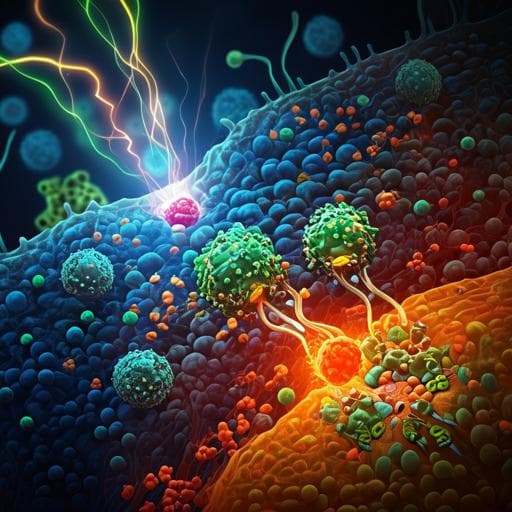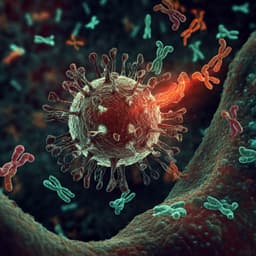
Medicine and Health
Microbial short-chain fatty acids modulate CD8+ T cell responses and improve adoptive immunotherapy for cancer
M. Luu, Z. Riester, et al.
The intestinal microbiota can influence the efficacy of cancer immunotherapies, including immune checkpoint inhibitors (ICIs) and adoptive cell therapies using tumor-specific CD8+ cytotoxic T lymphocytes (CTLs). Specific commensal bacteria (e.g., Akkermansia muciniphila and Bifidobacterium spp.) and defined microbial consortia have been shown to augment anti-tumor immunity and improve responses to PD-1/CTLA-4 blockade. While microbial organisms can modulate therapy outcomes, less is known about soluble microbial metabolites as tools to enhance cellular immunotherapies. Short-chain fatty acids (SCFAs) such as acetate, propionate, and butyrate are abundant microbial metabolites; butyrate is linked to Treg expansion and protection from autoimmunity and GVHD, yet SCFAs can also enhance effector T cell functions. Pentanoate (valerate), produced by low-abundance commensals like Megasphaera massiliensis, is not widely produced by dominant gut bacteria. The central question is whether ex vivo exposure of CTLs or CAR T cells to microbial SCFAs, particularly pentanoate and butyrate, can reprogram these cells metabolically and epigenetically to improve anti-tumor activity in vivo.
Prior studies show gut microbiota composition affects responses to ICIs and adoptive T cell therapies, with specific taxa (Akkermansia, Bifidobacterium) and defined bacterial consortia enhancing CD8+ T cell-mediated anti-tumor immunity. SCFAs (acetate, propionate, butyrate) modulate T cell biology: butyrate and propionate enhance Treg suppressive function and can promote CD4+ effector functions; SCFAs influence CD8+ effector and memory formation during viral infection. SCFAs act via epigenetic mechanisms (HDAC inhibition) and metabolic effects (influencing glycolysis/mTOR). Pentanoate has been less studied in cancer immunotherapy but has been reported to modulate CD4+ T cell function via HDAC inhibition and mTOR activation. These findings set the rationale to test SCFAs as ex vivo modulators to boost CTL and CAR T cell efficacy.
- Bacterial metabolite profiling: Multiple human gut commensals were cultured to stationary phase; cell-free supernatants were collected by sequential filtration. SCFA content (including pentanoate, butyrate, acetate, propionate) was quantified by chromatography/mass spectrometry. Megasphaera massiliensis and related species were assessed for pentanoate production.
- CTL generation and treatments: Murine CD8+ T cells were isolated from spleen/lymph nodes and activated under suboptimal CTL-polarizing conditions with anti-CD3/anti-CD28 plus IL-2. Cells were treated in vitro with SCFAs (acetate, propionate, butyrate, pentanoate; dose ranges optimized for efficacy/toxicity), with focus on butyrate and pentanoate. HDAC inhibitors were used as controls/comparators (trichostatin A, mocetinostat [class I], TMP-195 [class II]).
- HDAC activity assays: Fluorometric assays measured pan-HDAC and isoform-specific class I vs class II activity in the presence of SCFAs or bacterial supernatants and in CTL lysates.
- Metabolic assays: mTOR and S6 phosphorylation were analyzed by phospho-flow or immunoblot after SCFA treatment. Glycolytic activity was assessed by extracellular acidification rate (ECAR) using a Seahorse XFe96 flux analyzer. Metabolic inhibitors (rapamycin for mTOR; 2-deoxyglucose for glycolysis) were applied to test pathway dependence.
- GPCR dependence: CTLs deficient for SCFA receptors GPR41 (FFAR3) and GPR43 (FFAR2) were tested for IFN-γ induction and HDAC inhibition after pentanoate treatment to assess receptor involvement.
- In vivo CTL efficacy: Antigen-specific OT-1 CTLs (CD45.1+) were pretreated ex vivo with pentanoate or butyrate (or bacterial supernatant, or HDAC inhibitors) and adoptively transferred into tumor-bearing mice (e.g., B16-OVA melanoma; Panc02-OVA pancreatic model). Tumor volume and mass were measured; transferred CTLs in draining lymph nodes/tumors were quantified for frequency, number, and cytokine production (IFN-γ, TNF-α). Additional experiments included Rag1-deficient mice with co-transfer of Tregs to model suppressive microenvironments; CD25 expression, IL-2 production, STAT5 phosphorylation, and proliferation (CFSE) were assessed.
- CAR T cell studies (murine): ROR1-specific murine CD8+ CAR T cells were generated, treated with pentanoate or butyrate ex vivo, and tested for activation markers (CD25), cytokines (IFN-γ, TNF-α), and in vivo efficacy in Panc02/ROR1 pancreatic tumor model after adoptive transfer.
- CAR T cell studies (human): Human CD8+ T cells and ROR1-CAR T cells from healthy donors were pretreated (e.g., pentanoate 4 mM; butyrate 1 mM; mocetinostat 300 nM; TMP-195 2.5 μM). Readouts included mTOR/S6 phosphorylation, CD25 expression, cytokine secretion (ELISA), proliferation (CFSE), and cytotoxicity against ROR1+ K562 target cells at varying E:T ratios.
- Statistics: Two-tailed unpaired Student’s t-tests and linear mixed-effects models with Tukey correction for multiple comparisons were used; data typically presented as mean ± SEM.
- SCFA production by commensals: Low-abundance Megasphaera massiliensis strains were strong producers of pentanoate and butyrate, unlike many abundant gut species. Megasphaera elsdenii produced pentanoate at lower levels.
- Effector function boost in CTLs: Supernatants from M. massiliensis and direct treatment with pentanoate or butyrate increased frequencies of IFN-γ+ TNF-α+ CD8+ T cells and elevated TNF-α secretion versus controls; acetate had minimal effect. Dose-finding established effective, low-toxicity concentrations; pentanoate and butyrate were prioritized.
- Epigenetic mechanism: Pentanoate and butyrate inhibited class I HDAC activity (but not class II) in CTLs and in enzyme assays. Pan-HDAC inhibitor TSA and class I inhibitor mocetinostat phenocopied increases in IFN-γ/TNF-α, whereas class II inhibitor TMP-195 did not. Valproate (a branched SCFA/HDAC inhibitor) similarly enhanced IFN-γ and induced T-bet/Eomes.
- Metabolic mechanism: Pentanoate increased phosphorylation of mTOR and downstream S6 protein and elevated glycolysis (ECAR). Rapamycin or 2-DG reduced IFN-γ induction, supporting mTOR/glycolysis involvement. Mocetinostat/TMP-195 did not activate mTOR, indicating SCFAs exert both HDAC-dependent and metabolic (HDAC-independent) effects.
- GPCR independence: Enhancement of CTL effector function and HDAC inhibition by pentanoate occurred in GPR41/FFAR3 and GPR43/FFAR2 double-deficient CTLs, indicating effects are independent of these SCFA GPCRs.
- In vivo CTL efficacy: Ex vivo pretreatment of OT-1 CTLs with pentanoate or butyrate reduced tumor volume and mass in B16-OVA melanoma; higher frequencies and absolute numbers of transferred IFN-γ+ TNF-α+ CTLs were detected in draining lymph nodes. M. massiliensis supernatant and class I HDAC inhibitor (mocetinostat) improved, while class II inhibitor (TMP-195) did not improve anti-tumor responses. In Panc02-OVA pancreatic model, pentanoate-pretreated CTLs showed improved engraftment/proliferation, elevated CD25, stronger IL-2/STAT5 signaling, and increased IL-2 production; 2-DG blocked pentanoate-induced CD25 upregulation.
- CAR T cell enhancement (murine): ROR1-CAR T cells pretreated with pentanoate or butyrate upregulated CD25 and produced more IFN-γ/TNF-α. In Panc02/ROR1 tumors, pentanoate-pretreated CAR T cells reduced tumor volume/weight and showed higher frequencies and numbers of IFN-γ+ TNF-α+ CAR T cells in tumors. Doses used included ~0.75 mM butyrate and 2.5 mM pentanoate in cited experiments.
- CAR T cell enhancement (human): In human CD8+ T cells and ROR1-CAR T cells, pentanoate and butyrate increased mTOR and S6 phosphorylation, CD25 expression, and secretion of IFN-γ/TNF-α. Pentanoate-pretreated human CAR T cells exhibited enhanced proliferation and cytolytic activity against ROR1+ targets compared with untreated CAR T cells.
- Representative quantitative example (from figure panel): Percent IFN-γ/TNF-α+ cells increased versus untreated (2.4% ± 0.1) with butyrate (9.3% ± 0.2) and pentanoate (8.3% ± 0.3); mocetinostat showed intermediate increase (~4.1% ± 0.1), TMP-195 minimal (~3.8% ± 0.1).
The study addresses whether microbial metabolites can be harnessed to improve adoptive cellular immunotherapies. Pentanoate and butyrate reprogram CTLs and CAR T cells through dual mechanisms: inhibition of class I HDACs leading to epigenetic activation of CTL-associated genes, and metabolic activation via mTOR/glycolytic pathways, independent of GPR41/43 signaling. This reprogramming increases expression of effector molecules (CD25, IFN-γ, TNF-α), augments IL-2-STAT5 signaling, and enhances proliferation and persistence in vivo, translating into superior tumor control in murine melanoma and pancreatic cancer models. The approach extends to human ROR1-CAR T cells, where SCFA pretreatment improved activation, cytokine production, and cytotoxicity in vitro, suggesting translational potential. These findings integrate with literature showing microbiota modulation of cancer immunotherapy, highlighting a metabolite-based strategy that is compatible with ex vivo T cell manufacturing and potentially with in vivo administration. The results are significant for enhancing the potency of adoptive T cell therapies and may inform GMP-compliant process optimizations.
Pentanoate and butyrate, two microbiota-derived SCFAs, enhance CTL and CAR T cell anti-tumor activity via class I HDAC inhibition and activation of mTOR-driven metabolism, increasing effector cytokine production and activation markers and improving tumor control in vivo. The effects are independent of SCFA GPCRs GPR41/43. Pentanoate also augments human ROR1-CAR T cell function, indicating translational promise. These microbial metabolites can potentially be integrated into ex vivo manufacturing of therapeutic T cells or considered for adjunctive administration post-infusion. Future work should define optimal dosing, timing, delivery routes, and safety, and evaluate efficacy across tumor models and CAR specificities, including clinical studies.
- Preclinical models: Findings are based on murine models and in vitro human assays; clinical efficacy and safety remain untested.
- Dosing and delivery: Optimal concentrations, exposure durations, and administration routes for SCFAs in clinical settings are not established and require further investigation.
- Specificity and breadth: Results are shown for OT-1 CTLs and ROR1-CAR T cells; generalizability to other antigens, CAR designs, and solid tumor microenvironments needs validation.
- Mechanistic scope: While class I HDAC inhibition and mTOR activation are implicated, the precise molecular targets, epigenomic landscapes, and long-term effects on memory/exhaustion were not comprehensively mapped.
- GPCR expression context: Lack of involvement of GPR41/43 was shown in spleen/LN-derived CTLs; effects in tissue-resident or gut-associated T cells with higher receptor expression were not examined.
Related Publications
Explore these studies to deepen your understanding of the subject.







